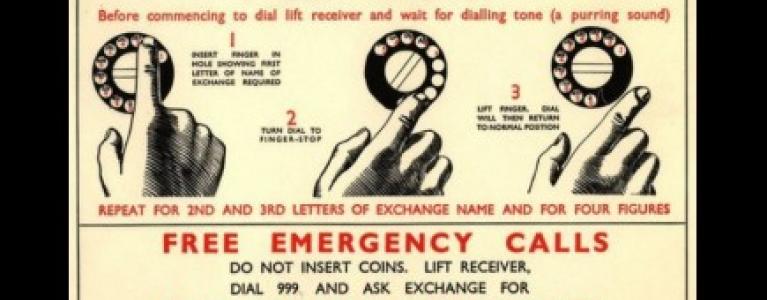
History of 999
The first ever 999 call was made right here in London on 30 June 1937, and was the first of its kind in the world. It was introduced following a review of a fire on Wimpole Street in November 1935 which sadly killed 5 women. The Belgrave Committee was set up to study the problem of operators’ identifying emergency telephone calls, and recommended that there should be a single number to alert the emergency services and that the number must be easy to remember. Another recommendation was that it should be possible to make emergency calls from telephone boxes without inserting any money. The solution…999.
Initially the 999 scheme only covered a 12-mile radius around Oxford Circus, and came with the advice that public should only use it in ongoing emergency "for instance, the man in the flat next to yours is murdering his wife or you have seen a heavily masked cat burglar peering round the stack pipe of the local bank building."
In the first week of service 1,336 calls were made. Today the 999 system in the UK handles in excess of half a million calls in the same 7 day period!
The system was rolled out to major cities after the Second World War and by 1976 to the whole of the UK. In 1993 the 112 number was introduced alongside 999 to provide a single number for contacting the emergency services throughout Europe.
Calling 999 today
When you call 999 these days, details of the caller’s phone number and address (if calling from a landline) flash immediately on the screen of the BT operator, who will swiftly confirm that the call is genuine, which emergency service is required and then transfer the call to the appropriate service. Of all 999 calls more than half go through to the police, with around 40 per cent going to the ambulance service, and the remainder going to fire and rescue service, coastguard and cave and mountain rescue services.
In order that emergency services can provide the help to people that most need it, it’s important that the 999 service is used appropriately. Below are links to information and advice from our emergency service colleagues on when the 999 service should be used
- Metropolitan Police Service
- City of London Police
- British Transport Police
- London Fire Brigade
- London Ambulance Service
The advice is simple - if it’s not an emergency, don’t ring 999. A range of non-emergency numbers are availible such as 101 the Police non-emergency number and NHS 111 for getting medical help fast when it’s not life-threatening, and advice and information is often available on emergency services websites.
As well as knowing when to call, don’t forget to lock your mobile phone when you put it in your pocket to avoid making ‘silent calls’ by mistake. Hoax calls are illegal and are taken seriously. It's also worth making sure that your children understand the importance of 999.
Matt, London Resilience Officer